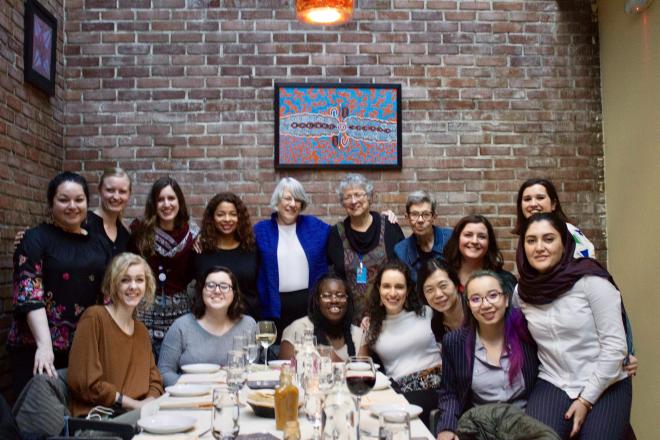Redefining Feminism at the 62nd CSW: A Student’s Perspective
Published on April, 44 2018
2018 UN Practicum in Advocacy students, Local2Global participants along with WILPF US Board Member Barbara Nielsen, Melissa Torres (Practicum Co-Faculty) and Dixie Hairston (Practicum Co-Faculty).
By Mikayla Varunok
WILPF US recently sent a delegation of college and university students to the 62nd Commission on the Status of Women at the United Nations headquarters in New York City, held March 12-23, 2018. The delegation consisted of ten students, one alumni practicum participant, and two Local2Global participants.
The week started off with the CSW NGO Consultation Day, where women from around the world shared their stories, work, gifts, and unique perspectives to inspire delegates and engage them in the important conversations around the challenges faced by women in rural areas and in the media industry.
The first WILPF-sponsored panel, titled “Women Halting War on North Korea: The Promise for All of RESOLUTION 1325 and Feminist Foreign Policy,” discussed Women Cross DMZ, the UN Security Council’s Resolution 1325, and the importance of women’s role in peacefully addressing the conflict between North and South Korea. This panel featured WILPF international president, Kozue Akibayashi, who discussed why a feminist peace movement to address these issues is more important than ever. Akibayashi concluded with a call to the international community for “the inclusion of a gender perspective in this endeavor to solve the longstanding Korean war.”
Towards the end of the week, during the WILPF debriefing session, PeaceWomen committee members, practicum participants, Local2Global delegates. and WILPF international members gathered to share their experiences with the CSW and the practicum. Everyone shared a deep appreciation for the opportunity to witness and take part in the conversation. “It really opens eyes and doors to a whole new world of possibilities,” said one student.
We discussed redefining feminist space and the challenges that come with it. Many felt that having a separate, more intimate space—like the WILPF office or the practicum debriefing sessions—was an essential part of their experience at the CSW. The debriefing concluded with a call to unite in peace as a global sisterhood. Everyone expressed gratitude to WILPF for providing space to reflect and debrief with our community. “I feel like I’ve learned just as much from these times as I do attending the sessions,” one practicum student said. Another student agreed, “learning from each other has been very powerful.”
The final WILPF-sponsored event was called “Intersectional Feminism: Sharing Leadership in Women’s Peace and Security Panel,” featuring the two current co-faculty leaders of the practicum, Melissa Torres and Dixie Hairston, as well as practicum alumni Ayca Mazman and Mikayla Varunok. Mazman and Torres critically discussed the issue of a lack of sufficient space for women of color to participate in feminist discussion.
Melissa Torres specifically discussed approaching intersectionality through the lens of systems of oppression. She defined systems of oppression as “the systemic mistreatment of a defined group of people that is reinforced by society…This system of advantage enables privileged groups to exert control over targeted groups by limiting their rights, freedom and access to necessary resources and social power/capitol. The privileged group is always the benefactor of the oppression.” She discussed redefining peace, freedom, what it means to be radical vs. revolutionary. and our own concept of feminism through an intersectional lens that considers cultural context. Her discussion highlighted how essential diverse perspectives are to attain true social equality.
Ayca Mazman then discussed the need to include diverse women in any feminist organizational structure. “You don’t need to be a voice for the voiceless,” she said, “just pass the mic.” She discussed the practicum as a way for WILPF to engage diverse women in the UN CSW and WILPF work. She also highlighted the importance of binational and multinational women’s voices in international feminist organizations. Because these women develop an intimate understanding of multiple cultures from an outside perspective, they have a unique advantage when critically evaluating each culture and “can easily become an agent of change.”
Mikayla Varunok discussed the importance of representation in engaging young women, women of color, and the LGBTQA+ community in digital social movements and the challenges each community faces online as these identities intersect. She highlighted the importance of strategically tailoring your online content so that it speaks both to your audience and to those you want to be involved with your organization.
Dixie Hairston concluded the panel by giving an overview of the history of the practicum and how it has grown and changed along with their methods of involving students. She discussed how she and Melissa have incorporated diverse perspectives and values of inclusion into practice when running the practicum. The practicum sets to encourage mentorship between current WILPF members and practicum students— relationships that are essential to young women’s sustained involvement in WILPF. She concluded by discussing how they are expanding their applicant pool and breaking down barriers of access to the practicum.
It was an immense privilege to critically evaluate and engage in conversations around international policy with decision-makers and influencers from around the world. More important was the support and critical dialogue between all WILPF members who attended the CSW. Everyone involved echoed a feeling of being energized and inspired by the many women they came across. This year’s CSW left us all with plenty to unpack and think about before CSW 63.
For more information on the UN Practicum in Advocacy, the Local2Global program or the WILPF’s work at the Commission on the Status of Women, please email practicum-mail@wilpfus.org.



